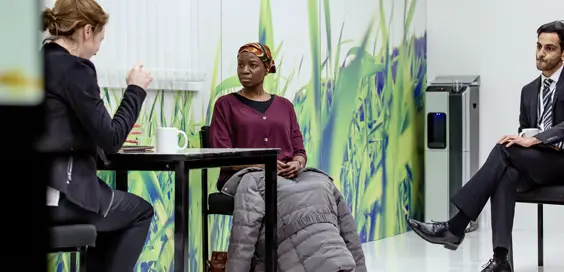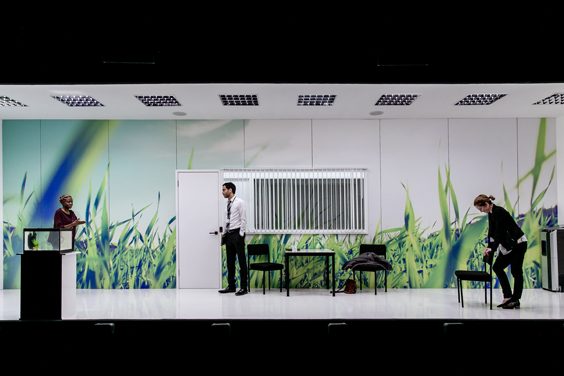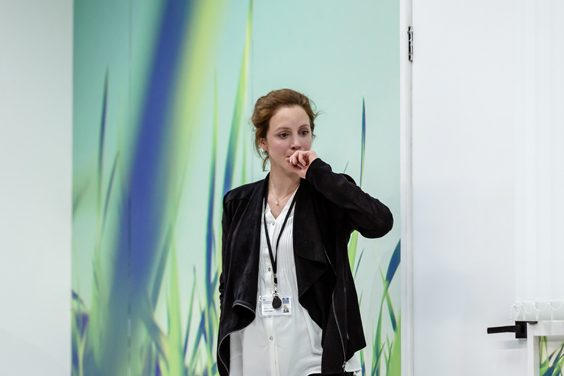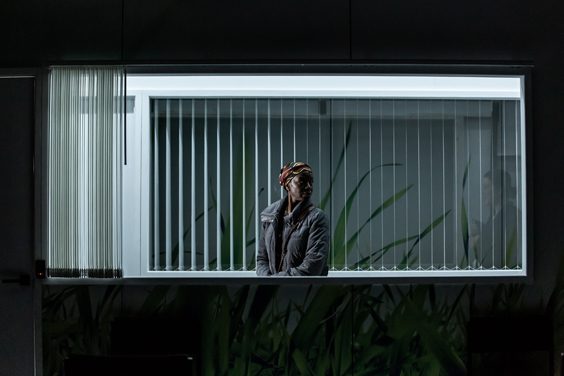hang – Review – Sheffield Lyceum

By Eve Luddington, February 2019
debbie tucker green writes her name and the titles of her plays in lower case letters. In hang, a 70-minute piece performed without an interval (premiered in 2015), her characters are named only in the programme: there, they are simply noted as One, Two and Three. The play is set in a room which is, likewise, sparse.
In Sheffield Theatres’ production, the room is long and narrow. It’s painted white, with a reed motif along the back wall, and washed in a calming green light. A locked door and a large window give on to a corridor with an identical window opposite. There’s a humming air conditioner on the second wall, a water dispenser by the third and carefully placed office table and chairs in the space between them. This building is basically sterile.
The one sign of life is a single goldfish swimming in a tank, positioned by the fourth, invisible wall – the wall which is, in fact, the audience. This is no accident: we, the audience are about to become observers of the action taking place in a confined and confining environment, and the goldfish in its tank can’t be ignored. Rosanna Vize’s clinical design captures perfectly tucker green’s searing take on the incidental brutality of bureaucracy.
“Consumed by grief and anger”
One and Two, officials, come into the room with Three, who seems impassive. They are professionally attentive, falling over themselves to make her feel comfortable with practical offers of refreshment and a choice of (identical) chairs. For what reason, we’re not told at first. Her silence makes them self-conscious. It’s an uncomfortable situation to watch.
Gradually, the context is revealed. In all respects bar one this could be present-day Britain: Three is the victim of an unnamed but horrendous family crime; she’s here to decide how her perpetrator should be executed.
The officials’ solicitude is based on textbooks and role play; it’s worse than inadequate when faced with a flesh-and-blood woman consumed by grief and anger, a woman who has spent three years trying to survive the aftermath of a crime. She’s having none of their concern, none of their platitudes: ‘I don’t need your concern. What can concern do?’ She jeers at their protocols: ‘Protocol didn’t happen in my house to me and mine.’
“Always engaged”
tucker green captures bureau-babble well and writes some painfully funny dialogue, ridden with half-sentences and overlaps. It highlights the inhumanity of a ‘caring’ system which is bound by procedure and unfit for purpose. Does that sound familiar?
Her drama really comes to life when the officials, more comfortable with facts than feelings in their rule-bound roles, describe in clinical detail the methods of execution Three may choose for the criminal perpetrator: lethal injection; gassing; shooting (euphemistically called ballistic expiry!), and hanging. She has chosen hanging before she entered the room – and hopes it will be botched at first so that it causes maximum agony. But there’s been ‘a development’ which might force Three to see the perpetrator as a human being: he has written a letter to her……
tucker green’s writing does not and perhaps isn’t intended to, draw the audience in. I, for one, was a critical observer, always engaged and speculating on the nature of the crime throughout, but never sentimentally attached to any one of the characters. Instead, I focused on the language and interaction, and ultimately on the impossibility of true understanding between victim and ‘care-workers’ in such a dehumanising system.
“Power of silence”
In less capable hands, the 70-minute ‘real-time’ piece might drag a bit – most of the action is psychological and the audience aren’t given easy emotional hooks or dramatic plot. But Sheffield Theatre’s production, directed by Taio Lawson, attends to every detail and nuance. The space is used well to describe the gulf between the victim and those appointed to support her. The pace brings urgency to the officials’ increasing embarrassment and desperation when they’re challenged; and it makes time to highlight the power of silence. That silence increases the effect of everyday mechanical sounds, which are amplified at significant moments. When Three is first left alone on stage, the air conditioning throbs almost menacingly. We feel her situation and state of mind. Sound designer, Dan Balfour, has done an excellent job here and throughout the play in highlighting mood this way.
All three actors are very strong. Their portrayal of the officials’ ineptitude is squirm-worthy and the soul-destroying effects of crime on the victim and her family, shocking.
“Potency of performance”
Diveen Henry plays Three with great conviction, initially holding her raging grief with a stillness which seems to mock the frantic activity, then expelling it with avenging power: her family is broken, her children are on ‘meds every day just to get through the day’; she can’t cope with her own feelings, let alone support the kids. Diveen Henry effectively re-enforces the invisible fourth wall between her character and the audience with the quietly dominating potency of her performance.
How dare the officials on-stage pretend to understand this character? How dare we? We can’t feel this character’s pain but are appalled at the day-to-day existence she describes, and we recognise that her bitterness is directed at the system as well as the crime’s perpetrator, and perhaps at us too, as colluders in the system. The solitary goldfish in its glass tank signifies much.
“Careless brutality”
The more senior official, One, is experienced in the job but uncomfortably out of her depth when challenged. Marianne Oldham’s face is like an open book, registering every nuance of her growing alarm and panic when the victim gets under her skin. It’s an excellent portrayal. Sid Sagar embodies the underling, Two, wet behind the ears, insecure in his role, insensitive to the situation and relieved to leave the room when the textbook interviewing technique fails. Sagar conveys such awkward gangliness it’s almost laughable.
This is an interesting play made more powerful by a production which illuminates the inhumanity and careless brutality of bureaucracy in a world where protocols mean more than people. Sheffield Theatres’ team gives the audience of hang an intense and appropriately disturbing experience.
images: The Other Richard













